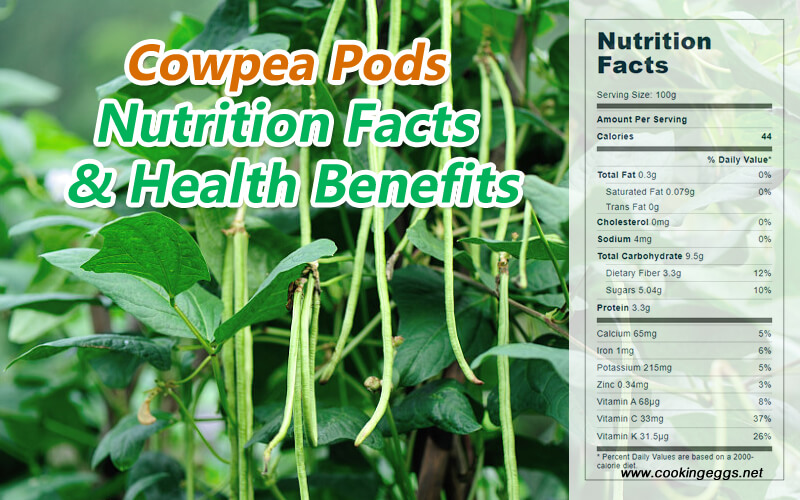Cowpea Pods Nutrition Facts & Health Benefits
Cowpeas are one of the oldest crops to be farmed and are grown throughout the tropics and subtropics. It is cultivated around the world primarily as a legume, but leaves and immature pods are also used as vegetables.
Cowpea is also known as black-eyed pea, southern pea, crowder pea, lubia, niebe, coupe, or frijole. Cowpea originated in Africa and is widely grown in Africa, Latin America, Southeast Asia, and the southern United States. The black-eyed cowpea type is grown primarily in California and is marketed as California black-eyed peas.
Nutritional Value of Raw Cowpea Pods
Cowpea is loaded with various types of nutrients. It is rich in fiber, protein, iron, and potassium and low in fat and calories. The cup of cowpea possesses 11.1 g of fiber, 13.22 g of protein, 4.29 mg of iron, 475 mg of potassium, 0.91 g of fat, and 198 calories. Along with that, various amino acids such as 0.612 g of tryptophan, 0.41 g of histidine, 0.188 g of methionine, and 0.894 g of lysine are contained in the seeds.

Raw Cowpea Pods Nutrition Facts Label
Health Benefits of Cowpea Pods
Cowpea leaves and pods are an excellent source of vitamins as well as antioxidants, serving multiple health benefits. Leaves have a high fiber content. The leaves are useful to treat diabetic, cardiovascular, and overweight conditions.
Dietary fiber is one of the most important bioactive components present in cowpea pods. It reduces constipation with the easy flow of bulky stool. The bulk is added to the stool because the fiber helps absorb the water. A diet rich in fiber reduces the chances of small pouches in the colon and hemorrhoids. Dietary fiber intake provides many health benefits, such as in diabetes, obesity, and cancer.
Cowpea pods can be considered a rich source of vitamin K. Research suggests that vitamin K can help support cardiovascular health and reduce the risk of osteoporosis. A deficiency of vitamin K may also weaken bones, potentially contributing to osteoporosis, and may promote calcification of arteries and other soft tissues.
Cowpea pods are high in vitamin C; they provide about 33 mg per 100 g. Vitamin C (ascorbic acid) is a powerful water-soluble antioxidant. It helps scavenge harmful, pro-inflammatory free radicals by virtue of its antioxidant properties. Vitamin C also boosts immunity to fight against flu infections.
Cowpeas contain isoleucine, which helps to raise endurance and also fixes the tissue in the muscles and promotes the clotting of the injury. The presence of amino acids enhances energy. Valine, isoleucine, and leucine are three chains of amino acids that enhance the recovery of muscles.